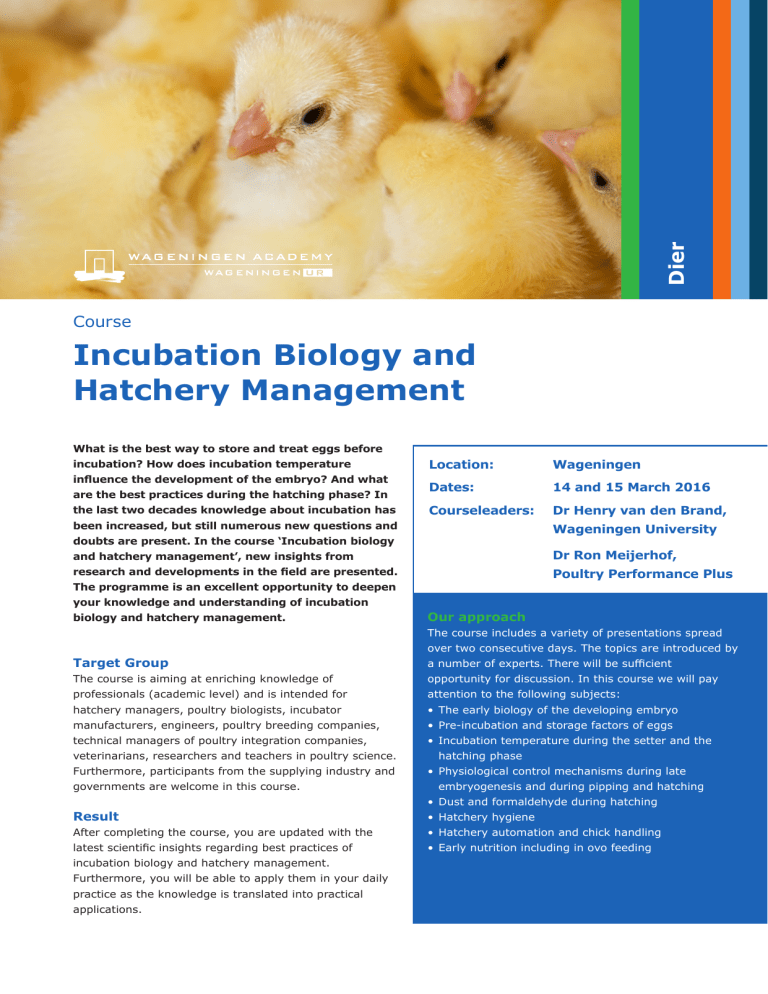
Dier
Course
Incubation Biology and
Hatchery Management
What is the best way to store and treat eggs before
incubation? How does incubation temperature
influence the development of the embryo? And what
are the best practices during the hatching phase? In
the last two decades knowledge about incubation has
Location:Wageningen
Dates:14 and 15 March 2016
Courseleaders:Dr Henry van den Brand,
been increased, but still numerous new questions and
Wageningen University
doubts are present. In the course ‘Incubation biology
and hatchery management’, new insights from
Dr Ron Meijerhof,
research and developments in the field are presented.
Poultry Performance Plus
The programme is an excellent opportunity to deepen
your knowledge and understanding of incubation
biology and hatchery management.
Our approach
The course includes a variety of presentations spread
Target Group
over two consecutive days. The topics are introduced by
a number of experts. There will be sufficient
The course is aiming at enriching knowledge of
opportunity for discussion. In this course we will pay
professionals (academic level) and is intended for
attention to the following subjects:
hatchery managers, poultry biologists, incubator
• The early biology of the developing embryo
manufacturers, engineers, poultry breeding companies,
• Pre-incubation and storage factors of eggs
technical managers of poultry integration companies,
• Incubation temperature during the setter and the
veterinarians, researchers and teachers in poultry science.
Furthermore, participants from the supplying industry and
governments are welcome in this course.
Result
hatching phase
• Physiological control mechanisms during late
embryogenesis and during pipping and hatching
• Dust and formaldehyde during hatching
• Hatchery hygiene
After completing the course, you are updated with the
• Hatchery automation and chick handling
latest scientific insights regarding best practices of
• Early nutrition including in ovo feeding
incubation biology and hatchery management.
Furthermore, you will be able to apply them in your daily
practice as the knowledge is translated into practical
applications.
Practical information
Course fee
The course fee of €1295,- includes tuition, course
materials, coffee/tea, two lunches, two network drinks
and a welcome dinner on day 1.
Registration
Registration closes at 29 February 2016, or if the
maximum number of participants is reached. Three weeks
before the course starts, participants will receive
additional information about the course. Registration is
possible via www.wageningenacademy.nl/en.
General terms and conditions
The general terms and conditions of Wageningen
Academy can be read at www.wageningenacademy.nl/en.
Programme
Day 1 Monday 14 March 2016
•The early biology of the developing embryo
Dr Marleen Boerjan, Pas Reform B.V
•Pre-incubation and storage factors
Dr Henry van den Brand, Wageningen University
•Physics of incubation
Dr Ron Meijerhof, Poultry Performance Plus
•Incubation temperature during the setter phase
Dr Henry van den Brand, Wageningen University
•Effects of egg origin during incubation
Ampai Nangsuay MSc, Wageningen University
•Bone development during incubation
Our offer
Wageningen Academy also offers in company
training,distance learning modules and summer
schools. Check our website for more options.
Carla van de Pol MSc, Wageningen University/
HatchTech B.V.
•Physiological control mechanisms during late
Contact
embryogenesis and during pipping and hatching
Prof. Eddy Decuypere, Catholic University Leuven
Program manager
Maaike Bartraij- De Vries
Day 2 Tuesday 15 March 2016
T +31 (0)317 48 23 09
E [email protected]
•Incubation temperature during the hatching phase
Conny Maatjens MSc, Wageningen University/
HatchTech B.V.
•Dust and formaldehyde during hatching
Pieter de Gouw MSc, Vencomatic B.V.
•(In ovo) vaccination in the hatchery
Rik Koopman MSc, MSD Animal Health
•Hatchery hygiene
Colin Russell BSc (Hons), PgD, FIBMS, Consultant
•Hatchery automation and chicken handling
Bas Smaal BA, Viscon Hatchery automation
•Early nutrition including in ovo feeding
Dr Ron Meijerhof, Poultry Performance Plus
Today’s knowledge,
tomorrow’s business





